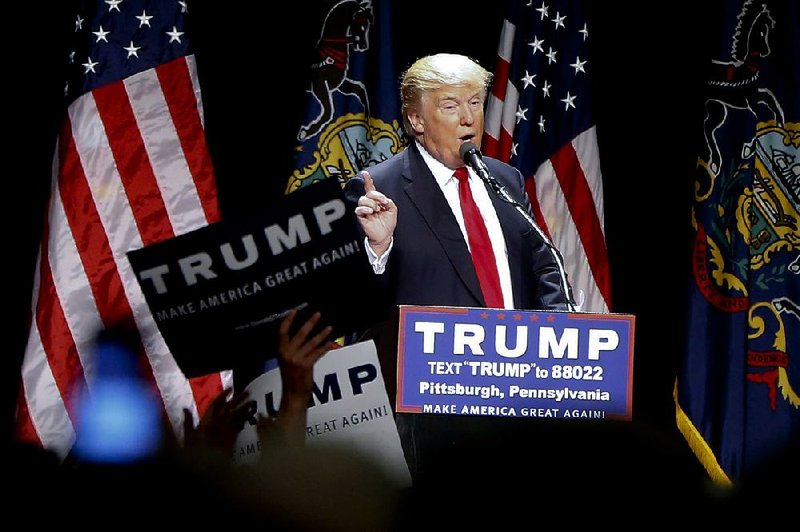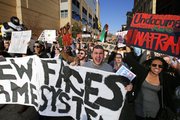WASHINGTON -- After spending millions of dollars in an attempt to sway Republican primary voters, big-money outside groups opposing Donald Trump have turned to a smaller target audience: the delegates who will actually choose the presidential nominee.
FULL ELECTION COVERAGE
The Our Principles super political action committee, which is devoted to keeping Trump from winning, and other super PACs backing Ted Cruz and John Kasich are spending their time and money researching the complex process of delegate selection and reaching out to those party insiders. None of the groups has put up ads for Tuesday's New York primary.
Delegates are the people -- typically longtime Republicans and state party activists -- who will have their say at the GOP convention this summer in Cleveland if no candidate locks up the nomination in the remaining voting contests.
The delegate focus comes after the groups' earlier efforts turned out to be money not particularly well spent. GOP-aligned groups spent at least $218 million on presidential television and radio ads, according to advertising tracker Kantar Media's CMAG. In one example, last month Our Principles put $2.3 million into ads trying to persuade Florida voters to ditch Trump, but he won the state anyway.
"At this stage, the delegate fight is the most important part of the race," said Tim Miller, a spokesman for Our Principles. "The work we're doing on it is how we get the biggest bang for our buck."
The Trump, Cruz and Kasich campaigns all pay specialists to help them with their own delegate strategy.
At a donor event last weekend at the Venetian casino resort in Las Vegas, pro-Cruz super PAC officials explained to a rapt audience how they are diving into data about Republican delegates. That super PAC event took place on the same floor as a Cruz campaign-finance event, which delved into similar material.
Douglas Heye, a former communications director for the Republican National Convention, said the organizational nature of a potential delegate fight plays into Cruz's strengths. The Texas senator has cultivated relationships with conservative leaders across the country. Now they're helping him woo delegates.
"Cruz hasn't done things in haphazard fashion," said Heye, who opposes Trump but is otherwise unaligned. "It takes a real team and the hard work of surrogates and coalitions to succeed at mastering the process in all 50 states."
New Day for America, a super PAC backing Kasich, is "executing a delegate outreach strategy," said spokesman Connie Wehrkamp. She declined to give details.
There are two phases to this fight for delegates. The first involves free agents in states where voters don't have a say.
Our Principles has keenly focused on these delegates, who hail from North Dakota, Colorado and Wyoming.
The group began reaching out through online advertising back in February, Federal Election Commission filings show. It then worked the phones and mailed literature. Finally, at the state convention site in Colorado Springs last weekend, three of its paid employees and about a half-dozen volunteers distributed "voter guides" likening Trump to President Barack Obama.
In both Colorado and North Dakota, Trump was shut out of delegates. Wyoming selects delegates this weekend.
If Trump can't secure 1,237 delegates to win the nomination outright, most of the delegates who are pledged to him in the first round of voting gain the freedom to vote at the convention for whomever they choose. That's why the three candidates are looking to make friends with them.
Unions, blacks courted in N.Y.
With Republicans haggling over delegate alliances, Hillary Clinton and Bernie Sanders held dueling rallies for support from union members and black voters Wednesday ahead of New York's Democratic primary.
Sanders' campaign said his Wednesday night rally in Manhattan's Washington Square Park drew 27,000 people, one of the largest gatherings in support of the senator from Vermont.
"When I look at an unbelievable crowd like this I believe we're going to win here in New York," Sanders declared in front of the Washington Square Arch in the city's Greenwich Village neighborhood.
Sanders mentioned Clinton by name throughout his speech, noting that she had the support of super PACs and had voted in favor of the Iraq war, drawing boos from the crowd and foreshadowing tonight's debate.
Clinton attracted a smaller but still enthusiastic crowd of 1,300 people at a Bronx community center, where she made no mention of Sanders but focused instead on Republicans.
"Mr. Trump wants to set Americans against each other. He wants us to build walls, I want us to build bridges," Clinton said. Referring to Cruz's earlier criticism of "New York values," Clinton said, "I think New York values are at the core of American values."
Earlier in the day, both Democratic candidates courted organized labor, with Sanders picking up support from the transit workers union and walking the picket line at one point with striking Verizon workers.
Clinton also walked a picket line in solidarity with the Verizon workers and addressed the National Action Network, led by the Rev. Al Sharpton, giving her a visible platform for New York City's black community. There she stressed her differences with Sanders on gun laws, calling gun violence a "national emergency."
Clinton so far leads Sanders in the race for the party's nomination, racking up more delegates and superdelegates.
Sanders addressed his second-place position in the lead-up to New York's contests, saying that "this is a tough race for us" given Clinton's tenure representing the state in the Senate. He also noted that the primary does not allow independents to participate or feature same-day registration. But he added defiantly, "I think we've got a surprise for the establishment."
Sanders on Wednesday also tallied a new endorsement in his column, with Sen. Jeff Merkley of Oregon providing the first such show of support from the legislative chamber where Sanders has served for nine years.
"From her time advocating for children as a young lawyer to her work as first lady of Arkansas and the United States, and as a senator and secretary of state, Hillary Clinton has a remarkable record. She would be a strong and capable president," Merkley wrote in The New York Times. "But Bernie Sanders is boldly and fiercely addressing the biggest challenges facing our country."
Oregon's primaries are May 17.
Information for this article was contributed by Nicholas Riccardi, Ken Thomas, Catherine Lucey and Rachel Zoll of The Associated Press and by David Weigel of The Washington Post.
A Section on 04/14/2016

